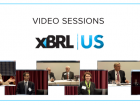
A Disclosure Revolution
Our thoughts on remarks by SEC Commissionor Kara Stein on efforts to “breathe new life into the critical matchmaking process between companies and investors”.

Our thoughts on remarks by SEC Commissionor Kara Stein on efforts to “breathe new life into the critical matchmaking process between companies and investors”.

After a year of revisions and “hundreds” of comments, the US Treasury has released a near final version of its schema outlining data definition standards to be used by federal agencies in reporting spending under the DATA Act. The DATA Act Information Model Schema (DAIMS) v1.0 gives an overall view of the hundreds of distinct data elements […]

The Surety Working Group formed by XBRL US has completed a Proposed Recommendation of its Work-in-Process Taxonomy for automating the reporting of elements related to identifying risks and determining eligibility for surety bonds.

Government oversight groups are praising a decision by the US House Rules Committee (a powerful body that manages the day to day activities of the US House of Representatives) to publish the text of the House Rules and eventually other related documents in XML format on GitHub. An interesting approach and one worth analysing. Learn more here.

We like to keep you abreast of developments at the major accounting standards bodies. To that end, the Financial Accounting Standards Board (FASB), which sets accounting standards in the US and is responsible for the US GAAP Taxonomy, has released its outlook for 2016, including results of a stakeholder survey on its future agenda. One […]

Can XBRL have a positive impact on costs and efficiency in the global USD $13.6B surety industry? Attend the upcoming XBRL US webinar to find out.

SEC Commissioner Michael Piwowar called on the SEC to “move promptly to modify EDGAR to permit inline XBRL and commence a voluntary pilot program to obtain more information about the costs and benefits of an inline XBRL system”.

Over 130 investors, analysts and other stakeholders met in NYC on 4 November for a forum hosted by XBRL US on improving financial analysis using structured data. Speakers from the CFA Institute, US Treasury and the SEC provided a picture of the current and future reporting landscape. But what made this event particularly useful was that the bulk of the […]

The adoption of XBRL in over 60 countries has powered the evolution from human readable only filings in the form of paper or pdf (which is just paper on a screen) to machine readable structured data. But humans want to read the same information that computers have access to – in familiar, document form. Enter Inline XBRL (iXBRL). By allowing XBRL data […]

Of the top ten countries rated by the World Bank as the most friendly to business, all leverage XBRL to some extent in their regulatory reporting.